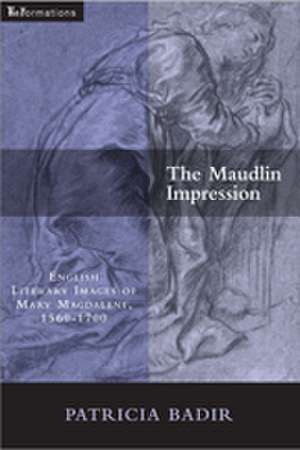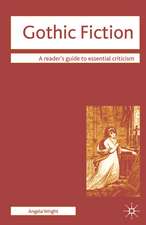The Maudlin Impression – English Literary Images of Mary Magdalene, 1550–1700: ReFormations: Medieval and Early Modern
Autor Patricia Badiren Limba Engleză Paperback – 14 oct 2009
Patricia Badir's The Maudlin Impressioninvestigates the figure of Mary Magdalene in post-medieval English religious writings and visual representations. Badir argues that the medieval Magdalene story was not discarded as part of Reformation iconoclasm, but was enthusiastically embraced by English writers and artists and retold in a wide array of genres. This rich study bridges the historical division between medieval and early modern culture by showing the ways in which Protestant writers, as well as Catholics, used the medieval stories, art, and symbolism related to the biblical Magdalene as resources for thinking about the role of the affective and erotic in Christian devotion. Their literary and artistic glosses protected a range of religious devotional practices and lent embodied, tangible form to the God of the Reformation. They employed the Magdalene figure to articulate religious experience by means of a poetics that could avoid controversial questions of religious art while exploring the potency and appeal of the beautiful.
The Maudlin Impression is a literary history of imitation and invention. It participates in the "religious turn" in early modern studies by demonstrating the resilience of a single topos across time and across changing Christian beliefs.
"In this historically rich and theoretically informed study, Patricia Badir argues that the medieval figure of Mary Magdalene serves as a 'site of memory' for early modern writers, enabling them both to reflect on what has been lost in the aftermath of the Reformation and to fashion their own Protestant and Counter-Reformation models of piety, repentance, mourning, and holiness. Drawing from poems, plays, sermons, homilies, biographies, and paintings, Badir convincingly demonstrates the remarkable resiliency and flexibility of the Magdalene trope in the sixteenth and seventeenth centuries. Her fascinating narrative traces the evolution of the Magdalene from the Reformation to the Restoration and raises provocative questions about the mnemonic function of religious art, the power of beautiful images in an iconoclastic culture, and the place of affect, longing, and embodiment in a Protestant poetics." --Huston Diehl, University of Iowa
"In the aftermath of the Reformation, the English wrote about Mary Magdalene. Sometimes she belongs to a specifically Protestant poetics: the gaudy Catholic whore turned Reformed penitent. Yet most post-Reformation Magdalenes resist Catholic-or-Protestant pigeonholing; instead, all unexpectedly, Badir's quick-eyed scholarship discloses continuities, convergences, recuperations. . . . [Her] book luminously teaches the all-important lesson that the Reformation fought in polemics was not necessarily the Reformation found in poetry." --Debora Shuger, University of California, Los Angeles
"A marvelously textured account from an early modern perspective of an alluring sacred figure about whom there has recently been a Renaissance of cultural interest--popular as well as scholarly. Badir subtly explicates how the theological and artistic issues concerning the devotional depiction of the Magdalene go to the core of Christian representational practice, provoking, all along the way, questions about gender, desire, and sacred eroticism." --Richard Rambuss, Emory University
The Maudlin Impression is a literary history of imitation and invention. It participates in the "religious turn" in early modern studies by demonstrating the resilience of a single topos across time and across changing Christian beliefs.
"In this historically rich and theoretically informed study, Patricia Badir argues that the medieval figure of Mary Magdalene serves as a 'site of memory' for early modern writers, enabling them both to reflect on what has been lost in the aftermath of the Reformation and to fashion their own Protestant and Counter-Reformation models of piety, repentance, mourning, and holiness. Drawing from poems, plays, sermons, homilies, biographies, and paintings, Badir convincingly demonstrates the remarkable resiliency and flexibility of the Magdalene trope in the sixteenth and seventeenth centuries. Her fascinating narrative traces the evolution of the Magdalene from the Reformation to the Restoration and raises provocative questions about the mnemonic function of religious art, the power of beautiful images in an iconoclastic culture, and the place of affect, longing, and embodiment in a Protestant poetics." --Huston Diehl, University of Iowa
"In the aftermath of the Reformation, the English wrote about Mary Magdalene. Sometimes she belongs to a specifically Protestant poetics: the gaudy Catholic whore turned Reformed penitent. Yet most post-Reformation Magdalenes resist Catholic-or-Protestant pigeonholing; instead, all unexpectedly, Badir's quick-eyed scholarship discloses continuities, convergences, recuperations. . . . [Her] book luminously teaches the all-important lesson that the Reformation fought in polemics was not necessarily the Reformation found in poetry." --Debora Shuger, University of California, Los Angeles
"A marvelously textured account from an early modern perspective of an alluring sacred figure about whom there has recently been a Renaissance of cultural interest--popular as well as scholarly. Badir subtly explicates how the theological and artistic issues concerning the devotional depiction of the Magdalene go to the core of Christian representational practice, provoking, all along the way, questions about gender, desire, and sacred eroticism." --Richard Rambuss, Emory University
Din seria ReFormations: Medieval and Early Modern
-
 Preț: 290.14 lei
Preț: 290.14 lei -
 Preț: 312.54 lei
Preț: 312.54 lei -
 Preț: 426.89 lei
Preț: 426.89 lei -
 Preț: 297.71 lei
Preț: 297.71 lei -
 Preț: 279.44 lei
Preț: 279.44 lei -
 Preț: 288.56 lei
Preț: 288.56 lei -
 Preț: 301.56 lei
Preț: 301.56 lei -
 Preț: 285.94 lei
Preț: 285.94 lei -
 Preț: 272.55 lei
Preț: 272.55 lei -
 Preț: 298.67 lei
Preț: 298.67 lei -
 Preț: 270.64 lei
Preț: 270.64 lei -
 Preț: 329.67 lei
Preț: 329.67 lei -
 Preț: 331.80 lei
Preț: 331.80 lei -
 Preț: 350.29 lei
Preț: 350.29 lei -
 Preț: 323.53 lei
Preț: 323.53 lei -
 Preț: 362.32 lei
Preț: 362.32 lei -
 Preț: 351.72 lei
Preț: 351.72 lei -
 Preț: 350.36 lei
Preț: 350.36 lei -
 Preț: 349.42 lei
Preț: 349.42 lei -
 Preț: 389.21 lei
Preț: 389.21 lei - 23%
 Preț: 459.67 lei
Preț: 459.67 lei
Preț: 300.58 lei
Nou
Puncte Express: 451
Preț estimativ în valută:
57.52€ • 59.98$ • 47.81£
57.52€ • 59.98$ • 47.81£
Carte tipărită la comandă
Livrare economică 21 martie-04 aprilie
Preluare comenzi: 021 569.72.76
Specificații
ISBN-13: 9780268022150
ISBN-10: 0268022151
Pagini: 320
Dimensiuni: 152 x 228 x 19 mm
Greutate: 0.48 kg
Ediția:1st Edition
Editura: MR – University of Notre Dame Press
Seria ReFormations: Medieval and Early Modern
ISBN-10: 0268022151
Pagini: 320
Dimensiuni: 152 x 228 x 19 mm
Greutate: 0.48 kg
Ediția:1st Edition
Editura: MR – University of Notre Dame Press
Seria ReFormations: Medieval and Early Modern
Recenzii
"Badir reveals a Magdalene far more complex than the iconic sinner-saint. This Magdalene represents Catholic sacramental devotion, Protestant attention to the Word, vain luxuriousness, meditative bereavement, and aristocratic allure." --Times Literary Supplement
"In this well-researched and clearly written book, Badir draws on poetry, homilies, plays, sermons, and paintings. A valuable contribution for scholars of Renaissance literature, this will also be accessible to serious nonspecialists curious about the figure of Mary Magdalene." --Library Journal
"[Badir] analyzes images of the Magdalene in literary texts by writers ranging from the somewhat obscure--the medieval period's Thomas Robinson and Lewis Wagner--to the canonical (John Donne, Nicholas Breton, Emilia Lanyer, George Herbert, Robert Herrick, and others). . . . This volume should interest anyone pursuing study of the early modern period, especially those focusing on religious texts." --Choice
"In an original and illuminating study, Badir writes a new history of the Magdalene figure, one that turns on the irrevocable loss of Christ, first through his ascension and again through Protestant revisions of Eucharistic theology . . . In Badir's insightful book, the Magdalene's unique and imaginatively captivating role articulates an emerging meditative and representational poetics of absence and presence, of desire and grief." --Renaissance Quarterly
Notă biografică
Patricia Badir is associate professor of English literature at University of British Columbia.















